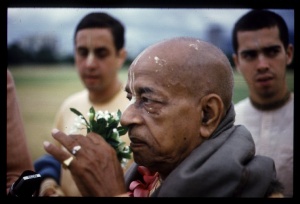CC Madhya 13.185: Difference between revisions
m (1 revision(s)) |
(Vanibot #0054 edit - transform synonyms into clickable links, which search similar occurrences) |
||
| (One intermediate revision by one other user not shown) | |||
| Line 1: | Line 1: | ||
{{ | [[Category:Sri Caitanya-caritamrta - Madhya-lila Chapter 13|C185]] | ||
<div style="float:left">'''[[Sri Caitanya-caritamrta|Śrī Caitanya-caritāmṛta]] - [[CC Madhya|Madhya-līlā]] - [[CC Madhya 13|Chapter 13: The Ecstatic Dancing of the Lord at Ratha-yātrā]]'''</div> | |||
<div style="float:right">[[File:Go-previous.png|link=CC Madhya 13.184|Madhya-līlā 13.184]] '''[[CC Madhya 13.184|Madhya-līlā 13.184]] - [[CC Madhya 13.186|Madhya-līlā 13.186]]''' [[File:Go-next.png|link=CC Madhya 13.186|Madhya-līlā 13.186]]</div> | |||
{{CompareVersions|CC|Madhya 13.185|CC 1975|CC 1996}} | |||
{{RandomImage}} | |||
==== TEXT 185 ==== | ==== TEXT 185 ==== | ||
<div | <div class="verse"> | ||
tathāpi āpana-gaṇe karite sāvadhāna | :tathāpi āpana-gaṇe karite sāvadhāna | ||
bāhye kichu roṣābhāsa kailā bhagavān | :bāhye kichu roṣābhāsa kailā bhagavān | ||
</div> | </div> | ||
| Line 12: | Line 16: | ||
==== SYNONYMS ==== | ==== SYNONYMS ==== | ||
<div | <div class="synonyms"> | ||
''[//vanipedia.org/wiki/Special:VaniSearch?s=tathāpi&tab=syno_o&ds=1 tathāpi]'' — still; ''[//vanipedia.org/wiki/Special:VaniSearch?s=āpana&tab=syno_o&ds=1 āpana]-[//vanipedia.org/wiki/Special:VaniSearch?s=gaṇe&tab=syno_o&ds=1 gaṇe]'' — to personal associates; ''[//vanipedia.org/wiki/Special:VaniSearch?s=karite&tab=syno_o&ds=1 karite]'' — to do; ''[//vanipedia.org/wiki/Special:VaniSearch?s=sāvadhāna&tab=syno_o&ds=1 sāvadhāna]'' — warning; ''[//vanipedia.org/wiki/Special:VaniSearch?s=bāhye&tab=syno_o&ds=1 bāhye]'' — ''externally; ''[//vanipedia.org/wiki/Special:VaniSearch?s=kichu&tab=syno_o&ds=1 kichu]'' — some; ''[//vanipedia.org/wiki/Special:VaniSearch?s=roṣa&tab=syno_o&ds=1 roṣa]-[//vanipedia.org/wiki/Special:VaniSearch?s=ābhāsa&tab=syno_o&ds=1 ābhāsa]'' — apparent anger; ''[//vanipedia.org/wiki/Special:VaniSearch?s=kailā&tab=syno_o&ds=1 kailā]'' — ''showed; ''[//vanipedia.org/wiki/Special:VaniSearch?s=bhagavān&tab=syno_o&ds=1 bhagavān]'' — the Supreme Personality of Godhead. | |||
</div> | </div> | ||
| Line 19: | Line 23: | ||
==== TRANSLATION ==== | ==== TRANSLATION ==== | ||
<div | <div class="translation"> | ||
However, just to warn His personal associates, the Supreme Personality of Godhead, Śrī Caitanya Mahāprabhu, externally expressed feelings of anger. | However, just to warn His personal associates, the Supreme Personality of Godhead, Śrī Caitanya Mahāprabhu, externally expressed feelings of anger. | ||
</div> | </div> | ||
| Line 26: | Line 30: | ||
==== PURPORT ==== | ==== PURPORT ==== | ||
<div | <div class="purport"> | ||
When Mahārāja Pratāparudra asked to see the Lord, Śrī Caitanya Mahāprabhu immediately refused, saying: | When Mahārāja Pratāparudra asked to see the Lord, Śrī Caitanya Mahāprabhu immediately refused, saying: | ||
| Line 36: | Line 40: | ||
(Caitanya-candrodaya-nāṭaka 8.23) | (Caitanya-candrodaya-nāṭaka 8.23) | ||
The word niṣkiñcanasya refers to a person who has finished his material activities. Such a person can begin to execute his activities in Kṛṣṇa consciousness to cross over the ocean of nescience. It is very dangerous for such a person to have intimate relationships with mundane people or to become intimately related with women. This formality is to be observed by anyone who is serious about going back home, back to Godhead. To teach His personal associates these principles, Śrī Caitanya Mahāprabhu expressed external anger when touched by the King. Since the Lord was very much satisfied with the humble behavior of the King, He intentionally allowed the King to touch Him, but externally He expressed anger just to warn His personal associates. | The word ''niṣkiñcanasya'' refers to a person who has finished his material activities. Such a person can begin to execute his activities in Kṛṣṇa consciousness to cross over the ocean of nescience. It is very dangerous for such a person to have intimate relationships with mundane people or to become intimately related with women. This formality is to be observed by anyone who is serious about going back home, back to Godhead. To teach His personal associates these principles, Śrī Caitanya Mahāprabhu expressed external anger when touched by the King. Since the Lord was very much satisfied with the humble behavior of the King, He intentionally allowed the King to touch Him, but externally He expressed anger just to warn His personal associates. | ||
</div> | </div> | ||
__NOTOC__ | |||
<div style="float:right; clear:both;">[[File:Go-previous.png|link=CC Madhya 13.184|Madhya-līlā 13.184]] '''[[CC Madhya 13.184|Madhya-līlā 13.184]] - [[CC Madhya 13.186|Madhya-līlā 13.186]]''' [[File:Go-next.png|link=CC Madhya 13.186|Madhya-līlā 13.186]]</div> | |||
__NOTOC__ | |||
__NOEDITSECTION__ | |||
Latest revision as of 21:39, 19 February 2024

A.C. Bhaktivedanta Swami Prabhupada
TEXT 185
- tathāpi āpana-gaṇe karite sāvadhāna
- bāhye kichu roṣābhāsa kailā bhagavān
SYNONYMS
tathāpi — still; āpana-gaṇe — to personal associates; karite — to do; sāvadhāna — warning; bāhye — externally; kichu — some; roṣa-ābhāsa — apparent anger; kailā — showed; bhagavān — the Supreme Personality of Godhead.
TRANSLATION
However, just to warn His personal associates, the Supreme Personality of Godhead, Śrī Caitanya Mahāprabhu, externally expressed feelings of anger.
PURPORT
When Mahārāja Pratāparudra asked to see the Lord, Śrī Caitanya Mahāprabhu immediately refused, saying:
- niṣkiñcanasya bhagavad-bhajanonmukhasya
- pāraṁ paraṁ jigamiṣor bhava-sāgarasya
- sandarśanaṁ viṣayiṇām atha yoṣitāṁ ca
- hā hanta hanta viṣa-bhakṣaṇato ’py asādhu
- (CC Madhya 11.8)
(Caitanya-candrodaya-nāṭaka 8.23)
The word niṣkiñcanasya refers to a person who has finished his material activities. Such a person can begin to execute his activities in Kṛṣṇa consciousness to cross over the ocean of nescience. It is very dangerous for such a person to have intimate relationships with mundane people or to become intimately related with women. This formality is to be observed by anyone who is serious about going back home, back to Godhead. To teach His personal associates these principles, Śrī Caitanya Mahāprabhu expressed external anger when touched by the King. Since the Lord was very much satisfied with the humble behavior of the King, He intentionally allowed the King to touch Him, but externally He expressed anger just to warn His personal associates.